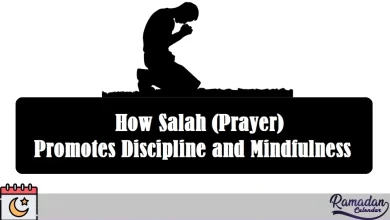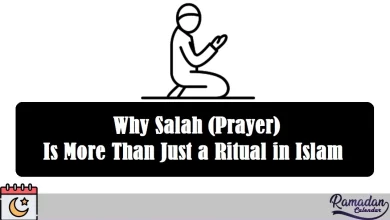The Significance of Salah (Prayer): A Pillar of Faith in Islam
The Significance of Salah (Prayer): A Pillar of Faith in Islam

The Significance of Salah (Prayer): A Pillar of Faith in Islam: In the vast and intricate fabric of Islamic practice, Salah (prayer) stands as an unwavering pillar, forming the bedrock of a believer’s faith. It is not merely a ritual but a profound act of devotion, connection, and discipline. As one of the Five Pillars of Islam, Salah is a daily reminder of our purpose and servitude to Allah, guiding us through life’s challenges and anchoring our spirituality in an ever-changing world.
The Quran and Sunnah emphasize the centrality of Salah in a Muslim’s life. Allah commands:
“Establish prayer, for prayer restrains from shameful and unjust deeds.” (Surah Al-Ankabut, 29:45)
This verse highlights the transformative power of Salah, not just as an act of worship but as a tool for moral and spiritual refinement. To understand its profound significance, we must delve into its role in shaping a believer’s faith, character, and life.
A Direct Line to Allah
Salah is unique among acts of worship because it establishes a direct and intimate connection with Allah. Each time a Muslim stands in prayer, they engage in a personal conversation with their Creator. The Prophet Muhammad (peace be upon him) said:
“When any one of you stands for prayer, he is conversing with his Lord.” (Sahih Bukhari)
This direct communication fosters a deep sense of closeness to Allah, reminding the believer that they are never alone. In moments of hardship, Salah becomes a refuge, offering solace and strength. In times of joy, it is a means of expressing gratitude. The act of bowing and prostrating symbolizes complete submission, humility, and devotion to the Almighty.
A Reminder of Purpose
In the hustle and bustle of modern life, it is easy to lose sight of one’s purpose and priorities. Salah serves as a constant reminder of our ultimate goal: to worship and obey Allah. By pausing five times a day, a Muslim realigns their focus, detaching from worldly distractions and realigning with their spiritual compass.
This regular engagement with prayer instills discipline and mindfulness. It punctuates the day with moments of reflection, encouraging believers to assess their actions and intentions. Salah not only enhances spiritual awareness but also creates a structured rhythm to life, promoting balance and harmony.
A Source of Spiritual Nourishment
Just as the body requires sustenance to thrive, the soul craves spiritual nourishment. Salah is the sustenance of the soul, rejuvenating it through the remembrance of Allah. The Quran describes the heart’s tranquility that emerges from this remembrance:
“Verily, in the remembrance of Allah do hearts find rest.” (Surah Ar-Ra‘d, 13:28)
Each posture in Salah—from standing to bowing, to prostrating—is imbued with significance. Prostration, in particular, is a moment of profound humility, where the believer is closest to Allah. The Prophet Muhammad (peace be upon him) said:
“The closest that a servant comes to his Lord is when he is in prostration. So, make plenty of supplication.” (Sahih Muslim)
This spiritual connection brings peace, clarity, and strength to navigate life’s trials. Salah provides the believer with a sanctuary, a moment to reset, and a source of unshakable inner peace.
Fostering Unity and Brotherhood
Beyond individual benefits, Salah has a profound communal aspect. Congregational prayers, particularly the Friday prayer (Jumu‘ah), foster a sense of unity and brotherhood among Muslims. Standing shoulder to shoulder, irrespective of social, economic, or cultural differences, symbolizes the equality and solidarity of the ummah (Muslim community).
The collective act of prayer strengthens bonds and reminds believers of their shared purpose and responsibility. This unity extends beyond the mosque, encouraging mutual support and compassion within the community.
Transformative Impact on Character
The discipline required for consistent prayer shapes a Muslim’s character. Salah instills qualities such as patience, humility, and gratitude. It serves as a shield against sinful behavior, as regular engagement in prayer fosters God-consciousness (taqwa). Allah states in the Quran:
“Indeed, prayer prohibits immorality and wrongdoing.” (Surah Al-Ankabut, 29:45)
This moral compass cultivated through Salah impacts every aspect of a believer’s life, guiding their interactions, decisions, and priorities. It encourages self-restraint, empathy, and a commitment to justice and kindness.
Practical Tips for Enhancing Salah
To fully reap the benefits of Salah, it is essential to approach it with sincerity and mindfulness. Here are some practical tips:
- Understand the Meaning: Learn the meanings of the Quranic verses and supplications recited in Salah. This deepens your connection and makes the experience more meaningful.
- Focus on Quality, Not Just Quantity: Avoid rushing through prayers. Take your time to reflect on each posture and supplication.
- Create a Prayer Routine: Establishing a consistent schedule ensures that Salah becomes an integral part of your day.
- Eliminate Distractions: Choose a quiet and clean space for prayer to enhance concentration and focus.
- Seek Forgiveness and Make Dua: Use the moments of prostration to seek Allah’s forgiveness and make heartfelt supplications.
Conclusion
Salah is far more than a ritualistic obligation; it is a profound act of devotion that nurtures the soul, refines character, and strengthens the believer’s connection with Allah. As a pillar of Islam, it is a cornerstone of faith, anchoring the Muslim’s life in discipline, mindfulness, and spirituality.
In a world often plagued by chaos and distraction, Salah offers a sanctuary of peace and purpose. It is a daily reminder of our ultimate goal and a pathway to success in both this life and the Hereafter. Embrace Salah not as a duty, but as a gift—a divine invitation to draw closer to Allah, seek His guidance, and find solace in His presence. Truly, there is no greater source of peace and fulfillment than standing before the Lord of all worlds in prayer.





